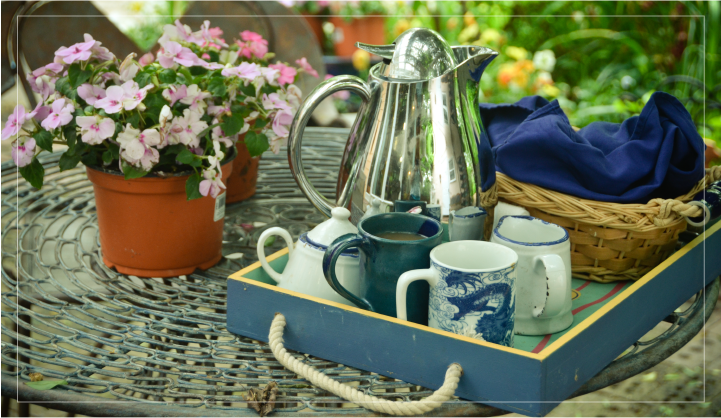Christians like to talk about what we call “authentic community.” It’s one of our buzzwords. We claim this kind of community is highly sought-after and highly valued; we claim we will go to great lengths to find it. We say it’s elusive–more elusive than it should be, considering we are all supposed to be “grace-giving” to one another. We say we want–wait, make that need–a place where we can be “transparent” and “invite people into our mess” without fear of being judged or cast aside. We want a safe harbor.
I’m throwing out quite a few buzzwords here, I know. These are buzzwords that have been on my mind a lot lately, as I’ve pondered whether or not we know what authentic community is really supposed to look like, or if what we are really longing for is a community of enablement.
A few years ago, a dear friend of mine came to me and confessed she’d had an affair. She was unhappy in her marriage, had suffered emotional and mental abuse, and was thinking about leaving her husband. I listened without judgement because I knew that was what she needed in that moment. But in subsequent conversations, I (gently) said some things she didn’t really want to hear–I questioned the dynamics of the affair; I told her that if her husband wanted a chance to change, she should let him try; I encouraged her to give marriage counseling a chance.
Asking a friend the hard questions is–well, hard. I worried a bit that I might be risking our friendship. It would have been easier to just get out my pom-poms and cheer her on as she stepped away from an unhappy marriage.
As time went on, I continued to be a safe place for her to talk about her feelings, the tough choices she faced, the decisions she made. And I continued to ask the hard questions–lovingly, without judgement, but still with honesty. Her family and some of the people who were friends with both her and her husband were less kind, which drove her to put distance between them and thus meant they lost any further opportunity to speak into her situation.
The line of accountability is a fine one. Lean too far to the right and you cross into judgement. Lean too far to the left and you become an enabler.
We say we want to be “messily transparent” without risk of being judged–but I wonder sometimes, do we really mean we don’t want to be questioned? Do we really mean we don’t want to be held accountable?
I’m part of several online communities of Christian women, all of which are touted as “safe places,” where we are “living out grace-filled, authentic community” in an online setting. Everyone marvels at how they never thought it was possible to have real friendships, a real support system online. These forums are plastered with rants about our in-laws, confessions about our marriages, worries about our kids, the dirty laundry of our respective pasts, and the crazy thoughts we think on a day-to-day basis.
There is a lot of pom-pom waving in these forums. In fact, that’s just about all there is. Empathy and sympathy know no bounds in these communities. In contrast, there is only a small handful of people who will ask the hard questions.
A friend and I joked the other day that if a member of one of these communities posted “I killed a guy last night,” someone would be sure to comment and say, “That’s okay, honey, I’m sure he had it coming.”
The thing is, when you “see” someone only online, when all you get is one side of every story, when you can’t be there in person to “do life” (sorry, another Christian buzzword there), how can you know you’re seeing the full picture? How can you feel justified in asking the hard questions? And even if you do, how can you know they’re the right questions? Can an online relationship really play a pivotal role in someone’s in-your-face, down-and-dirty, real everyday life? Because this is not The Truman Show.
Grace is beautiful, yes. Unconditional love and support are beautiful. Empathy and sympathy are beautiful. These things are the sugar in the recipe of good relationships, and online Christian communities do sugar well, that’s clear. But relationships also need salt. They need hard questions and challenging–they need accountability. And I’m not convinced online communities can offer the salt of a face-to-face community. Or, if they can, perhaps we just lack the courage to add salt. Perhaps it is easier and more comfortable to just wave our pom-poms. Perhaps it’s simply nice to know we have a place we can go where other people will wave their pom-poms endlessly for us.
Don’t misunderstand me–I love my online communities. I love the warmth and support and how we all cheer each other on in both the good and the bad. I’m just trying to ask the hard questions, here, because I worry that there’s a danger we will forget we need face-to-face relationships, too. I think we simply need to be sure we aren’t sacrificing our real lives and real relationships for something that happens only on a screen.
A few months ago, a girl in one of my online communities got engaged to a guy she met a month prior. Everyone was cheering and waving their pom-poms while I sat back and watched, jaw on the floor, unsure. All I could think was that she’d known this dude for one month–a mere thirty days–and she was ready to say “forever” to him. That freaked me the heck out. But I didn’t say anything because I didn’t want to be a Debbie Downer. She isn’t my real-life face-to-face friend, so I didn’t feel it was my place to question her decision. I decided it was best to leave the accountability to her parents, her in-person friends, her church people.
Quite possibly, that’s exactly the way it should be. Maybe we ought to leave the hard stuff of doing life together–the accountability and the hard questions–to our face-to-face communities. But if so, maybe what we all need is to recognize that an online community, as lovely and sugar-filled as it may be, can only offer us so much. And maybe we need to stop claiming it’s so authentic. Maybe we need to stop giving it more than its due.
We need friends who will walk the hard roads with us in person, who will sometimes say things we don’t want to hear, who can wrap their real, physical arms around us, who can lean across a table, look us in the eyes, and say, “I’m with you, friend.” There’s just no replacement for that.





Love this, Harmony. But as another one who asks the hard questions, I’ll just suggest that the pom pom phenomenon isn’t just online. People don’t really want salt in their in-person relationships either. They want Grace and unconditional acceptance without anyone daring to ask a question, because questions are judgemental, don’t you know? And even friends of almost ten years don’t have the right to question.
So I suspect the online situation has grown out of the in person one, and now they feed each other. We’ve reached a point where even the gentlest, most loving hard question is seen as hate instead of an attempt for iron to sharpen iron. It makes me heartsick. And I have no idea what to do about it.
Good points! I do agree! Thankful for the (very few) friends I do have who are willing to do the hard stuff of friendship!
“Perhaps it is easier and more comfortable to just wave our pom-poms.” This phenomenon makes me want to move to Gilligan’s Island. In my mind it implies I will never have authentic community because I think…you’re cheering for THIS? Thank you for writing this…
Well, you know Robin Lee, you are one of that small handful I mentioned…
Oh my goodness, you are speaking such truth. I had the same reaction to the quick marriage thing. In my retreat, we talk a great deal about how brave true authenticity and vulnerability are and how essential they are to healthy, life-giving relationships in a world drowning in comparison and competition. An example I often use is how sad I feel every time I hear someone in an online community say this is the only place she feels safe being real. While I too LOVE my online community, I know I am in unhealthy waters when I’m only talking to people through my computer or only sharing myself with online friends. A wonderful addition, but a bad substitution for fave to face intimacy and community. GREAT stuff, Harmony!!
<3
I agree; it’s hard for me to understand how one might equate an exclusively online friendship with a eye-to-eye friendship. There’s something about looking into another’s eyes. You can see and gauge and perceive things that are simply impossible to detect in mere digital form. Typed words mute cadence and tone and often lead to misunderstanding. A true and bosom friend earns trust through grace received and given over time and through life. Then, the truth is couched in love and received as such. Friends like these are far and few between. They’re treasures, and you’re right, Harmony, they need to sit at my table from time to time. I have a few, and I am so very grateful! Thanks for sharing.